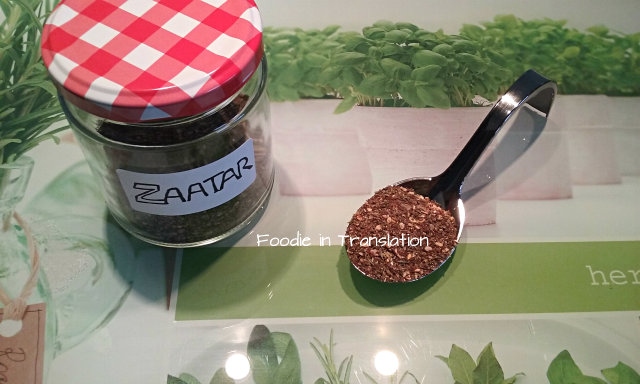Le mille e una... spezia!!
One thousand and one... spices!!
Le mille e una... spezia!!
One thousand and one... spices!!
 |
| La Rubrica del Venerdì: Zaatar - Friday's Page: Zaatar |
Mi capita spesso di leggere ricette internazionali e ovviamente mi imbatto in spezie a me sconosciute.
L'ultima volta ho scoperto il sumac, una spezia ricavata dalle bacche di un arbusto della famiglia delle Anacardiaceae, la Rhus Coriara, che cresce al caldo, soprattutto in Medio Oriente e in Sicilia.
Sembra che fosse conosciuta dai Greci e dai Romani, e che fosse utilizzata nel Medioevo, anche se non se ne hanno notizie precise.
Di solito si trova in polvere e viene sparsa direttamente sul pesce o sulla carne, oppure viene sciolta in un pochino d'acqua e poi aggiunta alla preparazione.
Un'altra cosa interessante è che il sumac serve per creare un mix di spezie tipico della cucina libanese, lo Zaatar, appunto.
In arabo, Zaatar significa timo, che è un altro degli ingredienti di questo mix.
Ma basta parlare, entriamo in azione!!
L'ultima volta ho scoperto il sumac, una spezia ricavata dalle bacche di un arbusto della famiglia delle Anacardiaceae, la Rhus Coriara, che cresce al caldo, soprattutto in Medio Oriente e in Sicilia.
Sembra che fosse conosciuta dai Greci e dai Romani, e che fosse utilizzata nel Medioevo, anche se non se ne hanno notizie precise.
Di solito si trova in polvere e viene sparsa direttamente sul pesce o sulla carne, oppure viene sciolta in un pochino d'acqua e poi aggiunta alla preparazione.
Un'altra cosa interessante è che il sumac serve per creare un mix di spezie tipico della cucina libanese, lo Zaatar, appunto.
In arabo, Zaatar significa timo, che è un altro degli ingredienti di questo mix.
Ma basta parlare, entriamo in azione!!
Zaatar
Ingredienti
2 cucchiai di sesamo dorato
4 cucchiai di timo secco
1 cucchiaio di origano
2 cucchiai di sumac
1 cucchiaino di sale
Ingredienti
2 cucchiai di sesamo dorato
4 cucchiai di timo secco
1 cucchiaio di origano
2 cucchiai di sumac
1 cucchiaino di sale
I often stumble upon some international recipes and I always find some spices I still didn't know.
Last time, I discovered the sumac, a spice made with the seeds of a shrub of the Anacardiaceae family, the Rhus Coriara, which grows in hot areas, mostly in Middle East and in Sicily.
We don't have precise information about it, but sumac was used in the Middle Ages and it seems that Greeks and Romans knew this spice already!
Usually you can find ground sumac to be sprinkled directly on fish and meat, or melted in a bit of water and then added at the preparation.
Another interesting fact, sumac is one of the main components of a typical Lebanese spices mix, the Zaatar, that is the subject of this article.
In Arabic, Zaatar means thyme, another ingredient of this mix.
Enough talking! Let's do it!!
Last time, I discovered the sumac, a spice made with the seeds of a shrub of the Anacardiaceae family, the Rhus Coriara, which grows in hot areas, mostly in Middle East and in Sicily.
We don't have precise information about it, but sumac was used in the Middle Ages and it seems that Greeks and Romans knew this spice already!
Usually you can find ground sumac to be sprinkled directly on fish and meat, or melted in a bit of water and then added at the preparation.
Another interesting fact, sumac is one of the main components of a typical Lebanese spices mix, the Zaatar, that is the subject of this article.
In Arabic, Zaatar means thyme, another ingredient of this mix.
Enough talking! Let's do it!!
Zaatar
Ingredients
2 tablespoons of sesame seeds
4 tablespoons of dried thyme
1 tablespoon of oregano
2 tablespoons of sumac
1 teaspoon of salt
Ingredients
2 tablespoons of sesame seeds
4 tablespoons of dried thyme
1 tablespoon of oregano
2 tablespoons of sumac
1 teaspoon of salt
Mettiamo tutti gli ingredienti nel mixer,
Put all the ingredients in a mixer,
mixiamo
mix everything
e il gioco è fatto!! 😁
and that's it!!😁
Enjoy your meal!!






0 comments:
Posta un commento